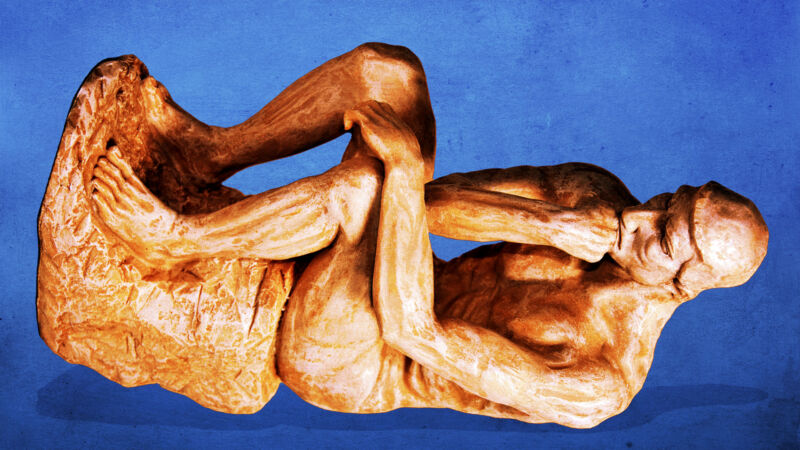Meet the winners of the 2023 Ig Nobel Prizes
Science / Science & Exploration
The award ceremony features miniature operas, scientific demos, and the 24/7 lectures.

The Ig Nobel Prizes honor "achievements that first make people laugh and then make them think."
Aurich Lawson / Getty Images
Curious about why geologists lick rocks or how many nose hairs there are on a human cadaver? Perhaps you'd like a snazzy dead wolf spider to use as a biodegradable robotic gripper? How about a "smart toilet" that analyzes your urine stream and fecal deposits while taking a picture of your anus for good measure? These and other unusual research endeavors were honored tonight in a virtual ceremony to announce the 2022 recipients of the annual Ig Nobel Prizes. Yes, it's that time of year again, when the serious and the silly converge—for science.
Established in 1991, the Ig Nobels are a good-natured parody of the Nobel Prizes; they honor "achievements that first make people laugh and then make them think." The unapologetically campy awards ceremony features miniature operas, scientific demos, and the 24/7 lectures whereby experts must explain their work twice: once in 24 seconds and the second in just seven words. Acceptance speeches are limited to 60 seconds. And as the motto implies, the research being honored might seem ridiculous at first glance, but that doesn't mean it's devoid of scientific merit.
Viewers can tune in for the usual 24/7 lectures, as well as the premiere of a "non-opera" featuring various songs about water, in keeping with the evening's theme. In the weeks following the ceremony, the winners will also give free public talks, which will be posted on the Improbable Research website.
Without further ado, here are the winners of the 2023 Ig Nobel prizes.
Chemistry/Geology Prize
Citation: "Jan Zalasiewicz, for explaining why many scientists like to lick rocks."
Anyone who knows a geologist or paleontologist has likely learned of a peculiar habit: licking rocks. Those scientists will tell you that it's a pretty good way to test if a rock is a rock or a piece of fossilized bone since the latter will stick to the tongue, and grinding said rock between the teeth for a moment can help ascertain the size of the grains—and thus whether the rock contains clay or silt. Zalasiewicz is a paleontologist at the University of Leicester in the UK, and he addressed the colorful history of the rock-licking practice, among other peculiarities, in an entertaining 2017 essay published in The Paleontological Association Newsletter.
"Wetting the surface allows fossil and mineral textures to stand out sharply rather than being lost in the blur of intersecting micro-reflections and micro-refractions that come out of a dry surface," Zalasiewicz wrote, recalling the time he licked a roadside rock that turned out to be a well-preserved Nummulites foraminifera. According to Zalasiewicz, this "taste for stratigraphy" might date back to an 18th-century mining engineer, surveyor, and self-professed mineralogist named Giovanni Arduino, who came up with categories for strata that eventually morphed into today's Geological Time Scale.
Arduino wrote a letter to Antonio Vallisneri, a professor at the University of Padua, in which he describes all the local rocks, minerals, and fossils in the valley of the Agno, including helpful tasting notes. For example, burnt fossil shells and bits of coal are "equally bitter and urinous." Water from springs flowing out of a stratum rich in marcasite and coal "have an acid spicy flavor" that Arduino likened to "the acidity of wine." One likes to think that Arduino would be pleased to learn that his "taxonomy of taste" remains a common analytical tool among modern-day rock lovers.
Literature Prize
Citation: "Chris Moulin, Nicole Bell, Merita Turunen, Arina Baharin, and Akira O’Connor, for studying the sensations people feel when they repeat a single word many, many, many, many, many, many, many times."
Most of us are familiar with the phenomenon of déjà vu: the sense that we've experienced something before, even though we haven't—an illusion of memory, if you will. The opposite of that is jamais vu, a fleeting sensation of novelty or unfamiliarity concerning something we have seen or experienced before: usually a word, but sometimes also people or places. Jamais vu is often a symptom of epilepsy or migraine. Moulin et al. had a hunch that jamais vu could be produced with so-called word alienation tasks and set out to test that hypothesis, conducting experiments with student volunteers from the University of Leeds.
The study participants dutifully copied the same selection of words over and over (and over) and were told to stop if they started feeling "peculiar," which usually occurred (in two-thirds of the participants) after 30 repetitions, or about one minute—the point of "semantic satiation." For instance, there were sensations of words losing their meaning the more one looked at them ("They just seem like a string of letters instead of a whole word"), or a familiar word suddenly seemed strange ("It doesn't seem right, almost looks like it's not really a word but someone's tricked me into thinking it is"). Those who reported experiencing déjà vu in their daily lives were much more likely to report experiencing jamais vu, suggesting a correlation between the two.


No comments:
Post a Comment